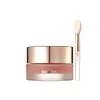What's inside
What's inside
 Key Ingredients
Key Ingredients

 Benefits
Benefits

 Concerns
Concerns

 Ingredients Side-by-side
Ingredients Side-by-side

Hydrogenated Polyisobutene
EmollientPolyisobutene
Phytosteryl/Isostearyl/Cetyl/Stearyl/Behenyl Dimer Dilinoleate
Skin ConditioningRicinus Communis Seed Oil
MaskingDiisostearyl Malate
EmollientOctyldodecanol
EmollientSynthetic Wax
AbrasiveEuphorbia Cerifera Wax
Ethylene/Propylene/Styrene Copolymer
Ethylene/Propylene Copolymer
AbrasiveMicrocrystalline Wax
Emulsion Stabilising1,2-Hexanediol
Skin ConditioningCaprylyl Glycol
EmollientDextrin Palmitate
EmulsifyingButylene/Ethylene/Styrene Copolymer
Pentaerythrityl Tetra-Di-T-Butyl Hydroxyhydrocinnamate
AntioxidantEthylhexylglycerin
Skin ConditioningBenzotriazolyl Dodecyl P-Cresol
UV AbsorberCI 77491
Cosmetic ColorantWater
Skin ConditioningCaprylic/Capric Triglyceride
MaskingRosa Canina Fruit Oil
EmollientShorea Robusta Seed Butter
EmollientLactobacillus Ferment Lysate
Skin ConditioningButylene Glycol
HumectantCamellia Japonica Seed Oil
EmollientRosa Centifolia Flower Extract
AstringentGlycine
BufferingSerine
MaskingGlutamic Acid
HumectantHippophae Rhamnoides Oil
EmollientAspartic Acid
MaskingLeucine
Skin ConditioningAlanine
MaskingLysine
Skin ConditioningCitrus Aurantifolia Flower Extract
AstringentArginine
MaskingTyrosine
MaskingPhenylalanine
MaskingProline
Skin ConditioningPrunus Persica Flower Extract
MoisturisingThreonine
Valine
MaskingIsoleucine
Skin ConditioningPyrus Malus Flower Extract
Skin ConditioningHistidine
HumectantCysteine
AntioxidantMethionine
Skin ConditioningHydrolyzed Collagen
EmollientAcetyl Hexapeptide-8
HumectantCitrus Aurantium Dulcis Flower Extract
Skin ConditioningPunica Granatum Flower Extract
Skin ConditioningHydrogenated Polyisobutene, Polyisobutene, Phytosteryl/Isostearyl/Cetyl/Stearyl/Behenyl Dimer Dilinoleate, Ricinus Communis Seed Oil, Diisostearyl Malate, Octyldodecanol, Synthetic Wax, Euphorbia Cerifera Wax, Ethylene/Propylene/Styrene Copolymer, Ethylene/Propylene Copolymer, Microcrystalline Wax, 1,2-Hexanediol, Caprylyl Glycol, Dextrin Palmitate, Butylene/Ethylene/Styrene Copolymer, Pentaerythrityl Tetra-Di-T-Butyl Hydroxyhydrocinnamate, Ethylhexylglycerin, Benzotriazolyl Dodecyl P-Cresol, CI 77491, Water, Caprylic/Capric Triglyceride, Rosa Canina Fruit Oil, Shorea Robusta Seed Butter, Lactobacillus Ferment Lysate, Butylene Glycol, Camellia Japonica Seed Oil, Rosa Centifolia Flower Extract, Glycine, Serine, Glutamic Acid, Hippophae Rhamnoides Oil, Aspartic Acid, Leucine, Alanine, Lysine, Citrus Aurantifolia Flower Extract, Arginine, Tyrosine, Phenylalanine, Proline, Prunus Persica Flower Extract, Threonine, Valine, Isoleucine, Pyrus Malus Flower Extract, Histidine, Cysteine, Methionine, Hydrolyzed Collagen, Acetyl Hexapeptide-8, Citrus Aurantium Dulcis Flower Extract, Punica Granatum Flower Extract
Diisostearyl Malate
EmollientPhytosteryl/Isostearyl/Cetyl/Stearyl/Behenyl Dimer Dilinoleate
Skin ConditioningHydrogenated Polyisobutene
EmollientButyrospermum Parkii Butter
Skin ConditioningSynthetic Wax
Abrasive1,2-Hexanediol
Skin ConditioningMicrocrystalline Wax
Emulsion StabilisingCentella Asiatica Leaf Extract
Skin ConditioningMadecassoside
AntioxidantEthylene/Propylene Copolymer
AbrasiveSimethicone
EmollientWater
Skin ConditioningButylene Glycol
HumectantAvena Sativa Kernel Extract
AbrasiveCalendula Officinalis Flower Extract
MaskingNepeta Cataria Extract
TonicRubus Idaeus Leaf Extract
Skin ConditioningStellaria Media Extract
Skin ConditioningBaptisia Tinctoria Root Extract
Skin ConditioningAlchemilla Vulgaris Leaf Extract
AntioxidantEquisetum Arvense Leaf Extract
AstringentUrtica Dioica Leaf Extract
Skin ConditioningParfum
MaskingLimonene
PerfumingLinalool
PerfumingCitral
PerfumingDiisostearyl Malate, Phytosteryl/Isostearyl/Cetyl/Stearyl/Behenyl Dimer Dilinoleate, Hydrogenated Polyisobutene, Butyrospermum Parkii Butter, Synthetic Wax, 1,2-Hexanediol, Microcrystalline Wax, Centella Asiatica Leaf Extract, Madecassoside, Ethylene/Propylene Copolymer, Simethicone, Water, Butylene Glycol, Avena Sativa Kernel Extract, Calendula Officinalis Flower Extract, Nepeta Cataria Extract, Rubus Idaeus Leaf Extract, Stellaria Media Extract, Baptisia Tinctoria Root Extract, Alchemilla Vulgaris Leaf Extract, Equisetum Arvense Leaf Extract, Urtica Dioica Leaf Extract, Parfum, Limonene, Linalool, Citral
Ingredients Explained
These ingredients are found in both products.
Ingredients higher up in an ingredient list are typically present in a larger amount.
1,2-Hexanediol is a synthetic liquid and another multi-functional powerhouse.
It is a:
- Humectant, drawing moisture into the skin
- Emollient, helping to soften skin
- Solvent, dispersing and stabilizing formulas
- Preservative booster, enhancing the antimicrobial activity of other preservatives
Butylene Glycol (or BG) is used within cosmetic products for a few different reasons:
Overall, Butylene Glycol is a safe and well-rounded ingredient that works well with other ingredients.
Though this ingredient works well with most skin types, some people with sensitive skin may experience a reaction such as allergic rashes, closed comedones, or itchiness.
Learn more about Butylene GlycolDiisostearyl Malate is an emollient and most often used in lip products. It comes from isostearyl alcohol, a fatty acid, and malic acid, an AHA.
As an emollient, Diisostearyl Malate helps create a thin film on your skin to trap moisture in. This helps keep your skin soft and smooth.
Ethylene/Propylene Copolymer is an exfoliant.
Hydrogenated Polyisobutene is a synthetic polymer. Polymers are compounds with high molecular weight. Hydrogenated Polyisobutene is an emollient and texture enhancer.
In one study, Hydrogenated Polyisobutene showed better skin hydration levels than Caprylic/Capric Triglyceride. As an emollient, it helps keep your skin soft and hydrated by trapping moisture in.
Hydrogenated Polyisobutene is often used as a mineral oil replacement.
Learn more about Hydrogenated PolyisobuteneMicrocrystalline Wax is created by de-oiling petroleum. It is highly refined and purified before being added to cosmetics.
Microcrystalline Wax is used to enhance the texture and create even consistency. It helps stabilize a product by preventing ingredients from separating.
We don't have a description for Phytosteryl/Isostearyl/Cetyl/Stearyl/Behenyl Dimer Dilinoleate yet.
Synthetic Wax is created from fossil fuels such as natural gas. It is used to enhance texture, adjust pH, and as an occlusive.
It may also be used as an abrasive ingredient to exfoliate the skin.
Synthetic Wax may not be fungal acne safe.
Learn more about Synthetic WaxWater. It's the most common cosmetic ingredient of all. You'll usually see it at the top of ingredient lists, meaning that it makes up the largest part of the product.
So why is it so popular? Water most often acts as a solvent - this means that it helps dissolve other ingredients into the formulation.
You'll also recognize water as that liquid we all need to stay alive. If you see this, drink a glass of water. Stay hydrated!
Learn more about Water